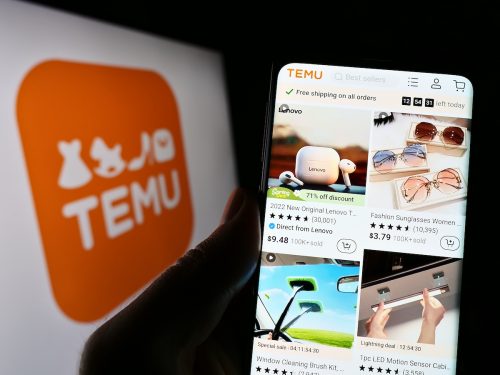Is Temu Legit? Things to Know Before You Shop

It was the 2023 Super Bowl that put Temu on the map in the U.S., but it was arguably this year’s game that made the online shopping powerhouse a household name. For the 2024 Super Bowl, Temu dropped $15 million on ads and giveaways, enticing viewers to “shop like a billionaire” despite its rock-bottom prices on everything from swimsuits to cell phone cases to ceiling fans. After that, the app’s fast rise led many of us to wonder: Is Temu legit?
Even if you didn’t catch the company’s Super Bowl ads, you’ve no doubt heard of Temu, either from its ads on Facebook and Instagram, influencer shopping hauls on TikTok, or news of its legal squabbles with the fast-fashion brand Shein. You can expect to see a lot more of the app soon, too.
According to Business of Apps, Temu’s gross merchandise volume skyrocketed from $3 million in the fall of 2022 to $15 billion in June 2023—and that’s projected to soar to $29.5 billion in 2024 and $41 billion by 2025. So, if you’re not buying from Temu, you can rest assured your friends, family members, and colleagues definitely are. Read on to learn more about the online retail giant, plus whether it’s safe, why it’s controversial, and whether it is legit or not.
RELATED: Is Shein Legit and Safe to Shop At?
What Is Temu?

To put it simply, Temu is an e-commerce website that sells a little bit of everything at dirt-cheap prices. Because of that, it often draws comparisons to Amazon.
“You should be able to find things like clothing, furniture, electronics, toys, health and beauty items, and more,” says Julie Ramhold, a consumer analyst with the shopping comparison site DealNews.com. “Basically, if you were going to look on Amazon, there’s a good chance you’d be able to find it or something similar on Temu as well.”
A major difference is that Temu is a little bit more fun—and, for better or worse, the company makes an effort to gamify certain aspects of the shopping experience.
“Temu incentivizes social sharing, encouraging users to share deals with friends in exchange for free products,” writes Digital Crew. “A progress bar adds a dash of excitement, showcasing how many more social shares are required before a gift can be redeemed.”
Temu launched in the U.S. in Sept. 2022 and operates under the legal name WhaleCo Inc. It’s owned by PDD Holdings, which also owns the Chinese e-commerce website Pinduoduo (more on them later!). To keep prices low, Temu uses a network of Chinese manufacturers that ship items directly to shoppers, according to Reuters.
Its popularity in the U.S. is undeniable. According to the app analysis website Sensor Tower, Temu is currently the top downloaded app in the App Store and on Google Play. Business of Apps reports that the app reached 250 million downloads in November 2023, up from 130 million downloads in July 2023 and just 15 million in 2022. This year, the app had 221 downloads between Jan. and May alone, Statista reports. The majority of those downloads were from the U.S., though the app is also popular in Mexico, the U.K., France, and Germany.
RELATED: Is Etsy Legit? Things to Know Before You Buy.
How Does the Temu App Work?

In a press release announcing its launch, Temu described its offerings as covering a “broad range of carefully curated products” across the categories of “fashion, beauty and health, home and garden, jewelry and accessories, electronics, shoes and bags, sports and outdoors, pet supplies, office products, and more.” Its homepage touts everything from musical instruments and smart home devices to sleepwear and luggage.
Most noticeable are the prices. You’ll find a 12-pack of kitchen sponges for under $1, a 6-foot phone charging cable also for under $2, and a drone equipped with a camera and remote control for a mere $14.95. Many clothes hover at the $10 mark, and laptops go for around $250. (All prices reflect the time of writing.)
Because Temu is restricted to sourcing items from Chinese manufacturers, you’ll find few name-brand products. If you want a new pair of AirPods, Rare Beauty makeup, Ugg boots, or something similar, you won’t have much luck on Temu—the best it will be able to provide is a low-cost dupe.
Temu’s manufacturing limitation also impacts its shipping times. According to its website, the Temu warehouse can take between one and three days to process each order. From there, free standard shipping can take 6 to 20 days; express shipping, which costs $12.90 on orders below $129 and is free for orders above that, takes between 4 and 9 days.
What Data Does Temu Collect From Users?
Whenever you upload your information to a new app or fork over your credit card number, you’ll want to be aware of that app’s privacy policy. “For months now, it’s been noted that Temu will collect more data than other comparable apps,” says Ramhold.
According to Temu, the app collects the obvious: things like your name, email address, and login credentials. If you make an account via an app like Facebook or Google, it also collects your profile image, username, and email address linked to that account.
When you make a purchase, Temu receives your payment information, shipping address, and phone number. It also gathers information while you shop, including which pages you view, how long you spend on them, and how you interact with them.
Then, it goes a step further. It collects information about your device’s model, operating system information, and language settings; it also tracks your approximate location data via your IP address. In addition, Temu uses third-party sources, like its affiliate partners, marketing partners, data brokers, public records, and social media services, to learn even more about you.
Right now, there’s no indication that the app collects external browser history, though it will note your history within the app.
RELATED: Is AliExpress Legit? What to Know Before You Shop.
Is Temu a Legitimate Website?
It depends on how you define “legitimate.” The app has a C+ rating from the Better Business Bureau (BBB) and is not listed as a scam. If you make an order, you’ll most likely receive it. However, users should be wary of cheaply made goods, heavy data collection, and potentially poor customer service should there be an issue with an order.
Why Is Temu So Controversial?
Some of the biggest controversy around Temu stems from its sister website, Pinduoduo. In March 2023, Google removed Pinduoduo from its app store after malware issues were found on versions of the app outside of the store. According to CNBC, the malware allowed the app to bypass user security permissions, access private messages, biometrics, Bluetooth and information about Wi-Fi networks, modify settings, view data from other apps, and prevent uninstallation.
As of press time, these issues haven’t been found in Temu. “There have been no reports of the malicious functionality present in official Play, App Store or third-party versions of Temu,” Daniel Thanos, vice president and head of Arctic Wolf Labs, the threat intelligence arm of cybersecurity firm Arctic Wolf, told CNBC. “The keys used to sign the Pinduoduo malware are not the same keys used to sign the Temu app.”
However, in Nov. 2023, a group of consumers filed a class action lawsuit in the U.S. District Court for the Northern District of Illinois, alleging that the Temu app is “purposefully and intentionally loaded with tools to execute virulent and dangerous malware and spyware activities on user devices” and that it gains access to “literally everything on your phone” including “facial characteristics, voiceprints, and fingerprints.”
In an email to Fashion Dive, a Temu spokesperson responded: “The class-action lawsuit’s allegations are largely derived from a report by a short-selling firm, which has vested commercial interests in disseminating negative misinformation.”
In June 2024, Arkansas Attorney General Tim Griffin announced that he would also sue Temu’s parent companies over “deceptive tactics” used to access customers’ private cell phone data. A Temu spokesperson issued a similar response.
It’s the app’s ties to China that make these allegations particularly serious. Consumers may remember a similar controversy surrounding the Chinese app TikTok. In May 2023, Montana governor Greg Gianforte banned TikTok, Temu, and other apps tied to countries the U.S. deems “foreign adversaries” from use on government devices.
There are also ethical concerns about how the extremely cheap items on Temu are made. In June 2023, a congressional report found that Temu does not have a system to ensure compliance with the Uyghur Forced Labor Prevention Act (UFLPA), a U.S. federal law implemented to ensure American companies do not fund forced labor among ethnic minorities in China.
“This all but guarantees that shipments from Temu containing products made with forced labor are entering the United States on a regular basis, in violation of the UFLPA,” the report explains.
RELATED: Is Alibaba Legit? What You Need to Know Before You Buy.
So, Is it Safe to Buy Products from Temu?

The old adage “you get what you pay for” seems to be true of Temu, too.
“Even if you aren’t concerned about security issues, Temu reviews will often call out issues like ordering an item and receiving something of lower quality or even nothing at all,” says Ramhold. “You may save upfront, but you could end up losing far more in the long run.”
The app currently highlights its name-brand products with a blue checkmark, but only a handful of brands are onboard. If a product doesn’t have a blue checkmark, you might get the item that’s pictured and described—or a shoddy dupe. Like Amazon, each product has a review section (and consumers seem to be quite honest in their reviews!), so you can see how an item has held up for others.
Customer Complaints Against Temu
As mentioned, Temu has a C+ rating with the BBB, and many of its nearly 1,600 customer reviews on the site are negative. Complaints include gripes about poor product quality, incorrect orders, slow shipping, piles of marketing emails, poor customer service, and issues redeeming discounts from the app’s games.
“I received somebody else’s order,” writes one customer on the BBB. “I contacted customer service as instructed on the website and I sent pictures with the package inside outside including the address pictures. They refused to refund because they said is not their fault that the wrong package arrived.”
“Their products are advertised as really cheap, because they are really cheap,” commented another reviewer on the BBB.
Quality aside, cyber security experts say their biggest fears are about the level of data the company collects—and that if the data gets into the wrong hands, it could lead to identity theft.
“The more information they get, the easier it is to steal their identity, especially with a company tied with China,” a representative from the BBB told CBS News. “You don’t know where it’s going, and the government has issued many warnings over the years. Because once you have all that data, they can use that data to harm the U.S. in some way.”
Some TikTok users and reviewers on the BBB said their credit card information was stolen after making a purchase from Temu; however, there’s no way to prove if the purchases and hacks were related. As of publication, Best Life could find no confirmed cases of identity theft directly correlated to the Temu app.
Conclusion
Like any e-commerce platform, you’ll want to use discretion if you decide to shop on Temu. Make sure to use a strong password, make your purchases through a credit card so you have a way to combat any incorrect charges, check user reviews on any products you plan to purchase, and stay up to date on company news so you can take the appropriate actions should the app be deemed malicious.
You may also want to find deals elsewhere. “Most security experts seem to agree that you shouldn’t shop Temu at all, and you certainly shouldn’t download the app,” says Ramhold. “I would say skip it and opt for a deeper dive on Amazon or even look at the marketplaces available on sites like Walmart and Target if you want more options.”
This story has been updated to include additional entries, fact-checking, and copy-editing.